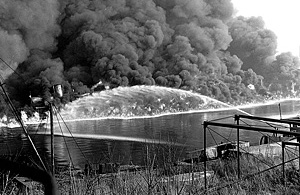Posts Tagged ‘Water Pollution’
Groups Win Latest Round in Frasure Creek Lawsuit
The lawsuits between Appalachian Voices and partners and Frasure Creek Mining read like the most complicated court crime novel, with fascinating — but slow-moving — plot twists galore. Eric Chance, AV’s water quality specialist, leads us through the latest attempts by the state of Kentucky to block environmental organizations from the proceedings.
Read MoreCourt Rules to Protect Virginia Rivers and Streams from Mining Pollution: A & G Coal to be Held Responsible for Unpermitted Discharges of Toxic Selenium
Contact: Matt Hepler, SAMS, 276-565-6167, mhepler24@gmail.com Kim Teplitzky, Sierra Club, 412-802-6161, kim.teplitzky@sierraclub.org Erin Savage, Appalachian Voices, 828-262-1500, erin@appvoices.org Appalachia, Va. – The U.S. District Court for the Western District of Virginia ruled Monday that A & G Coal is responsible for discharging toxic selenium from their Kelly Branch mine into nearby Callahan Creek. The Court…
Read MoreKentuckians Challenge Cabinet’s Order for Failing to Protect Clean Water from Coal Pollution
Resources Citizen’s petition for review (May 2013) Citizens’ Objection Letter (Jan 2013) Cabinet and Frasure’s Agreed Order FOR IMMEDIATE RELEASE Appalachian Voices * Kentuckians For The Commonwealth * Kentucky Riverkeeper * Waterkeeper Alliance CONTACTS: • Eric Chance, Appalachian Voices, 828-262-1500, eric@appvoices.org • Pat Banks, Kentucky Riverkeeper, 859-200-7442, kyriverkeeper@eku.edu • Peter Harrison, Waterkeeper Alliance, 828-582-0422, pharrison@waterkeeper.org…
Read MoreTennessee Legislators Dodge Vote on Mountaintop Removal Although a bill to protect Tennessee’s mountains received broad citizen and political support — and media attention from around the world — state legislators chose to deny public testimony on the measure and instead let the Scenic Vistas Protection Act die without a vote. Appalachian Voices Tennessee Director…
Read MoreCitizens Object to State of Kentucky’s Backroom Deal With Coal Company
Resources Citizens’ Objection Letter Agreed Order Click for full-sized image Appalachian Voices * Kentuckians For The Commonwealth * Kentucky Riverkeeper * Waterkeeper Alliance Contact: • Eric Chance, Appalachian Voices, 828-262-1500, eric@appvoices.org • Ted Withrow, Kentuckians For The Commonwealth, 606-782-0998, tfwithrow@windstream.net • Pat Banks, Kentucky Riverkeeper, 859-200-7442, kyriverkeeper@eku.edu • Peter Harrison, Waterkeeper Alliance, 828-582-0422, pharrison@waterkeeper.org Frankfort,…
Read MoreBringing Polluters to Justice — One Court Case at a Time
By Eric Chance and Erin Savage On Oct 1., Appalachian Voices and a coalition of citizens’ groups reached a historic settlement in a Kentucky case involving some of the most far-reaching and astonishing violations of the Clean Water Act in its 40-year history. The agreement between the citizens’ groups, International Coal Group, Inc., and the…
Read MoreKeeping Up with the Fracking Frenzy
By Brian Sewell The debate surrounding the controversial method of hydraulic fracturing for natural gas shows no signs of slowing down. The N.C. Department of Environment and Natural Resources recently submitted a final report in its shale gas study to the state general assembly. The report highlights the importance of establishing a strong regulatory framework…
Read MoreCoalition Acts to Protect Virginia Rivers and Streams from Mining Pollution
For Immediate Release May 3, 2012 – – – – – – – – – – – – – – – – – – – Contact: Tom Cormons, Appalachian Voices, 434-981-6506, tom@appvoices.org Sean Sarah, Sierra Club, 330 338-3740 sean.sarah@sierraclub.org Sam Broach, Southern Appalachian Mountain Stewards, 276-523-1702, sbroach1@verizon.net – – – – – – – –…
Read MoreToo Big to Fail, But Not to Change
When “pink slime” hit the headlines in March, Americans were rightfully disgusted. The thought of being poisoned for profit by beef-product filler treated with ammonia sparked national outrage. Grocery stores and even mega-fast food restaurants such as McDonald’s and Taco Bell were quick to publicly shun the slimy substance. Over the course of just a…
Read MoreYesterday and Today: Defending the Clean Water Act
By Jamie Goodman Forty years ago, it took a flaming river to spur our nation to protect its waterways. The river that played a prominent role in the creation of the Clean Water Act and the Environmental Protection Agency is thought to have erupted in flames on thirteen separate occasions in a one-hundred-year period, ending…
Read More

